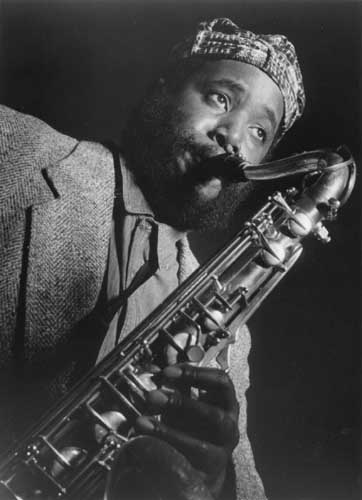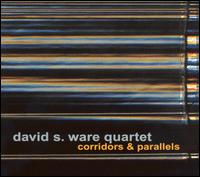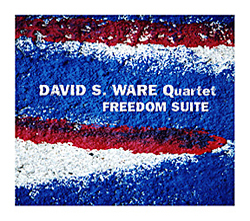

Courtesy of David S. Ware



A FIRESIDE
CHAT WITH DAVID S. WARE
(September
19, 2002)
Often
referred to as the "king of free jazz," David S. Ware has become
a cult hero of sorts for all the Albert Ayler/John Coltrane circa Meditations
fiends that have been foaming at the mouth for a standard bearer (they
forget a living Peter Brotzmann). Ironically, the man they've chosen to
crown does not play free or avant-garde. In fact, Ware is pretty tame
in comparison to Ken Vandermark, Mats Gustafsson, Charles Gayle, or Joe
Maneri. But it is Ware that has to bear the burden and it shouldn't be
his to bear. I have long been a devotee of Ware and the one thing I can
say for certain is he hasn't been to Los Angeles since Reagan was in office.
Ware sat down with the Roadshow to talk about his latest release, Freedom
Suite, the tenor's take on the Sonny Rollins opus, unedited and in his
own words.
FRED
JUNG: My glee that you had received major label attention via your contract
with Columbia was short lived.
DAVID
S. WARE: Well, it didn't really affect me too much, Fred, because we knew
it (the demise) was coming and either it was going to get a lot better
or it was going to do what it did. Branford (Branford Marsalis) left and
almost everybody else we were working with up there left. I came in on
a new administration, so we went out on a new administration and when
you do things like put people in there who don't know anything about jazz
and it's supposed to be a jazz department and you have people from other
genres of music running it, you can expect that. You can expect that they
don't know what the hell is going on with the music and you can expect
not to be there. So we could see it all coming when Branford left. Like
I said, other people left and it just wasn't any surprise.
FJ: College radio has been behind the music and the quartet has gained
a heavy underground following and no recognition?
DAVID
S. WARE: No, no. It all comes down to individuals, Fred. If they don't,
first of all, if they don't know what jazz is all about and they came
to hear the band live and they couldn't deal with it, so it was just a
matter of weeks before we got the notice. It is all individuals, Fred.
Either you know or you don't know. If you don't know the history of a
particular band, you're not into what they're doing and you don't know
what they've done, so why should you? You're going to get paid whether
you do it or not, so you have no motivation to really do your job correctly.
You've been put in a certain slot and you know the higher ups say that
the George Washingtons are not adding up and so you start cutting. That
is all you know how to do. You start cutting and you start bring in people
and you don't know what the hell you're doing really. As far as I'm concerned,
it is just a matter of total ignorance. In fact, you've got nobody working
with you that is telling you that they are such and such and they've done
such and such and if you don't know these things and you've got no one
to tell you then what are you working on? You are just working from what
you know from a whole other kind of perspective and you've got nobody
to tell you nothing. You are working on a platform of ignorance. There's
nowhere to go. There's nowhere to go.
FJ: How long was your stint with Cecil Taylor?
DAVID
S. WARE: I played with Cecil for eighteen months, a year and a half. Cecil
is a top-notch composer, which I didn't fully appreciate at the time that
I was with the band, which I have certainly learned since. It is really
the compositional aspect that I was able to take, the compositional aspect
of his work years later because at the time I was with him, I was young
and I felt that I had something to prove with all this and I'm trying
to do that and I'm not paying close enough attention to his compositions
and how they set up and how I could really work on the inside of them,
instead I worked on the top of the composition. I didn't work on the inside.
Since then, since all those years ago, I've learned about all of that
and I've learned to appreciate it as well, writing things for my own musicians
and wanting them to deal with it and not just play over the top of it
and not just keep playing the same old shit over and over. You can really
work with the material that's been given, no matter how simple it might
be sometimes. That's really what I learned from the Cecil Taylor experience.
FJ: Let's touch on your new release on AUM Fidelity, Freedom Suite.
DAVID
S. WARE: Well, it was a request of a certain festival for us to do that,
perform that. They wanted us to perform that. So it was working so well
that we just kept playing in and it just kept opening up and we decided
that we should probably record it. That's how it came about. There's just
a lot of places in there that can be stretched out and opened up and so
that's what we tried to do. I basically used his melody , but I just kind
of added to it or rearranged it a little bit on the melody. That was all
it took for us. We could see that it was working. We performed it quite
a lot, quite a few times before we had to play it at the festival that
requested it and so it really started to open up. I didn't really choose
it. They chose it for me to play. So that is how it happened. That was
the progression of it.
FJ: Originally Rollins recorded it in trio form, you with your quartet,
what did the addition of Mat Shipp bring to the table?
DAVID
S. WARE: Well, you have the whole dimension of the piano, Fred, which
is lends itself to the expanse of the music. Not that you can't do it
with a trio, but that's what the band is, we just dealt with it. That's
just the way I think. I think with a piano when I am thinking about a
piece of music, I'm thinking with a piano in some kind of way.
FJ: You've kept the current version of the quartet (Shipp, William Parker,
Guillermo Brown) for a while.
DAVID
S. WARE: This has been about three and a half years since she (Susie Ibarra)
left. Those two players (Shipp and Parker) are there because of their
connectiveness to what it is that we're doing in general and their commitment
to this situation, this particular situation and that's why those two
players are there, from their commitment and their willingness to always
try, it has a lot to do with scheduling too. They are able to do their
own thing, with their own bands, with other bands, whatever and they still
make it a point to always do what it is we do with the quartet. That's
not so easy to find, that kind of commitment, so when you have it, you
try to keep it.
FJ: Whose idea was it to have Shipp play synth on Corridors & Parallels
(AUM Fidelity)?
DAVID
S. WARE: It was mine. It was mine. I just wanted to try a different sound.
We're still not finished with it. We'll get back to that at some point.
I just wanted to play with a new sound and see what we could come up with.
FJ: I read the rags and you garner a good many references to Ayler and
late Trane.
DAVID
S. WARE: (Sighs) Well, you know, Fred, I do things quite differently from
both of those players, Fred. I was certainly influenced by both of them.
I'm influenced by a whole lot of different people if people pay attention,
which they don't really pay that close attention to, but I think at this
point, Albert Ayler is really inappropriate. That is really inappropriate
at this point. They don't, they're not listening. They're not listening,
Fred. They are just not listening. Maybe they listened to a record one
time and they think they know it all. But, no that is not happening. As
far as the inside of the music, the sound, maybe the sound is one thing
and maybe that it all that you hear is the sound, but everything else
is quite different. Maybe they mean the sound. If you want to ask me,
I think I have come into my own. I think I sound original enough to own
that. I have come into my own. Each record is different. There is no one
record where you can say that this is my whole way of operating right
here or whatever. The way I deal with melody and the way I deal with swing,
I think I've come into my own. I think that is what they ought to, stop
being so damn lazy and try to get into a little bit more. Get into the
inner workings of the music if they feel that they know the music or they're
supposed to know what's going on. Get into the inner workings of what
I do with a melody, what I do with motifs and so forth and so on.
FJ: Granted Shipp and Parker have wandered into some mainstream spotlight
of late, but prior to their recent recognition, they were knocked for
not being on the same level, paralleling Rollins and his bands through
the years.
DAVID
S. WARE: Well, I haven't read all the reviews, but out of all the hundreds
of reviews that I have read, I haven't read that one. That's a new one
to me. I always thought they pretty much recognized the talent of the
entire band and how well we do work together because we are all basically
working on the same level here. Nobody is out beyond ten thousand miles
apart from anybody.
FJ: Is Europe a friendly ground?
DAVID
S. WARE: There's more places in Europe, for us it is anyway. Everything
that we do everywhere is very well received. We haven't been anywhere
that it is poorly received. Sometimes the situation around where we're
playing at is not what it should be, whatever, but other than that, we
are pretty well received wherever we go, whether it is East Coast or West
Coast.
FJ: West Coast, the left has been weathering a Ware drought.
DAVID
S. WARE: Well, we almost got there last year, but it was a simple matter
of business. If you can't get the guarantee that you're looking for, we
may pass it up because we're not teenagers no more. We need to make a
certain amount. We need to take home a certain amount because we've all
got families and homes like everybody else, so we can't run around playing
for half of what it should be or whatever. Like I said, we were almost
there last year and it was because of the guarantee that we didn't do
it. We went to San Francisco. We went to Yoshi's. We went to three or
four places out there.
FJ: And the future?
DAVID
S. WARE: We go back to Europe at the end of October and probably nothing
after that until March. We'll probably be back to Europe in March. That's
the way it looks right now. I am looking forward to getting feedback on
this one.
FJ: Both William and Guillermo have recorded for Shipp's Thirsty Ear series,
how come you haven't gone into the studio?
DAVID
S. WARE: There maybe some things in the future. I don't want to talk about
it too much. It may be some things coming in the future.
Fred Jung is the Editor-In-Chief and
is in heaven knowing the Raiders are in first place with the Chargers?
Comments? Email Him